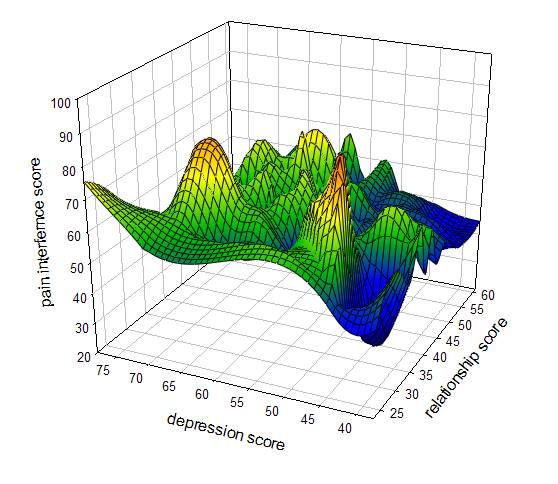Session Information
Date: Tuesday, November 7, 2017
Title: Pediatric Rheumatology – Clinical and Therapeutic Aspects Poster III: Juvenile Arthritis
Session Type: ACR Poster Session C
Session Time: 9:00AM-11:00AM
Background/Purpose: Juvenile Idiopathic Arthritis (JIA) is associated with symptoms of anxiety and depression. We studied these symptoms and other health related quality of life (HRQOL) domains in JIA patients over a 3 year period, because associations between these domains have not been completely determined.
Methods: At each visit, all JIA patients meeting ACR classification criteria seen by M.L.M. receive Patient Reported Outcome Measurement Information System Short Form questionnaires v.1.0 (PROMIS) as part of routine care. Scores were calculated for mobility, anxiety, depressive symptoms, fatigue, peer relationships, pain interference domains. Data extracted by optical mark recognition software was merged with EMR data, using Extract/Transform/Load software, for all visits March 2014 – February 2017, including active joint counts, visit age, ANA, RF, and B27 status.
Results: Data from 148 patients (114 females for 435 visits; 34 males for 118 visits; median 14.35 yrs, IQR 4.65) were analyzed, 70 oligo-JIA, 9 extended oligo-JIA, 19 ERA, 21 poly-RF- JIA, 5 poly-RF+ JIA, 11 undifferentiated arthritis, 3 psoriatic, 10 systemic arthritis. For all patients, by forward stepwise regression, depression scores were predicted by anxiety, pain interference, and peer relationship domains (p<0.001), but not other domains. Topological data modeling showed that patients endorsing depressive symptoms often reported anxiety and, less often, problems with peer relationships (figure). 31 patients (21%: 28 females, 3 males) had depression scores 60% or greater, with no predilection for subtype. However, per centile depression scores were comparable to normal reference scores (40.6, IQR 14.4); females had higher scores (43.5 IQR 14.4) than males (37.7 IQR 5.8)*. Anxiety scores, which correlated with depression scores (r=0.814), also were lower than norm scores for all patients (42.6 IQR 20.9), but higher for females (42.6 IQR 10.5 v. 39.5 IQR 13.7)* (*p<0.001 Mann-Whitney Rank Sum Test). There were no gender differences for other domains. No specific differences were distinguished by disease activity, JIA subset, laboratory results, or medications taken.
Conclusion: We found depressive symptoms related to anxiety, pain interference and peer relationship in JIA patients. While anxiety and depressive symptom scores were comparable to reference scores, PROMIS was effective in quickly identifying individual patients in need of additional support. PROMIS is effective in identifying the nature of HRQOL problems in JIA patients.
To cite this abstract in AMA style:
Miller M, Yan Y, Lales G. Symptoms of Depression and Anxiety in Children with JIA: Relation to Other Domains of Health Related Quality of Life [abstract]. Arthritis Rheumatol. 2017; 69 (suppl 10). https://acrabstracts.org/abstract/symptoms-of-depression-and-anxiety-in-children-with-jia-relation-to-other-domains-of-health-related-quality-of-life/. Accessed .« Back to 2017 ACR/ARHP Annual Meeting
ACR Meeting Abstracts - https://acrabstracts.org/abstract/symptoms-of-depression-and-anxiety-in-children-with-jia-relation-to-other-domains-of-health-related-quality-of-life/

